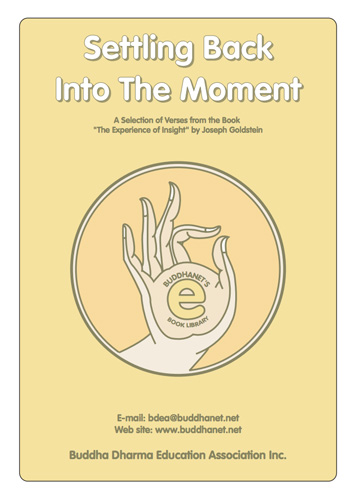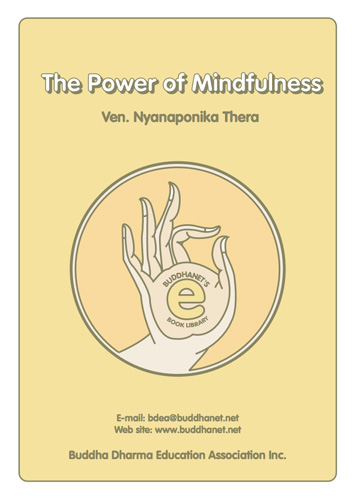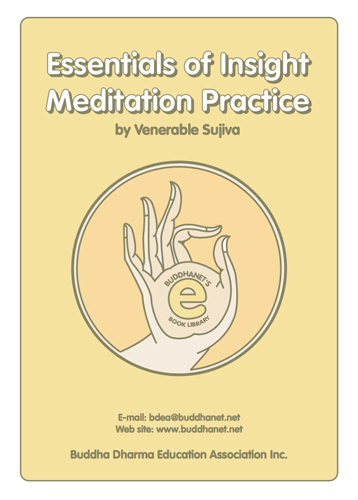 Last additions - eBook Library Last additions - eBook Library |

settleback.pdfSettling Back Into The Moment4112 viewsA selection of verses from the book 'Experience of Insight' , by Joseph Goldstein. This book belongs to a different genre, not a book in the sense of having a beginning and an end. It is a compilation of excerpts that stand alone in meaning whichever way your finger may flip open the page. Readers are strongly encouraged to read Joseph Goldstein's Experience of Insight - a simple and direct guide to Buddhist Meditation (Published by Shambala Publications, Inc.) from whose book this compilation is attributed.Jan 01, 1970
|
|

seeding.pdfSeeding the Heart3445 viewsGregory Kramer
Loving-kindness Meditation with Children. The practice of loving-kindness, or metta, can be done in one of two ways: either in intensive prolonged meditation to develop deep states of concentration, or in daily life at any time one meets with people and animals or thinks about them. To learn about the radiating of metta to all beings with children, we have to tap into the store of knowledge accumulated by lay people and parents. It must be knowledge which has grown out of years of living and loving with children and young adults. Gregory Kramer, father of three boys, shows us here with what subtle but precise adjustments in the standard practice of loving-kindness he was able to anchor it in the lives of his children.Jan 01, 1970
|
|

med-guided2.pdfGuided Meditation for Primary Students4739 viewsBuddhaNet's Buddhist Studies for Schools
This is a series of guided meditations with instruction for teachers for primary students. This file is part of BuddhaNet's Buddhist Studies for Schools. It has seven guided meditations for students, with detailed instructions for teachers.Jan 01, 1970
|
|

scrn_metta.pdfMetta Bhavana; Loving-kindness; Meditation4116 viewsVen. Dhammarakkhita
This is short explanation on how to practise Metta Bhavana or Loving-kindness Meditation given as a three-day weekend retreat at Dhammodaya Meditation Centre in Nakhon Pathom in Thailand, by an Australian monk, Ven. Dhammarakkhita (Jeff Oliver).Jan 01, 1970
|
|

hello_with_love.pdfHello - with Love & Other Meditations3647 viewsMaster Visuddhacara
The three most important things in life are love, kindness and wisdom. If we have made these three values the priorities of our life, then our life will have been well-lived. When we die we can only have happiness when we look back and not regrets. Wealth, fame, power, status, worldly success and pleasures - these are insignificant compared to love, kindness and wisdom. Cultivate the latter. If we spend our life cultivating this trio, our birth and life will have been worthwhile; it will not have been in vain. In this booklet, Ven. Visuddhacara shares his understanding of this practice of mindfulness and loving-kindness with a view to encourage all of us to walk the path.Jan 01, 1970
|
|

brahmavihara.pdfBrahmavihara Dhamma4710 viewsVen. Mahasi Sayadaw
This Brahmavihara Dhamma (Divine Abidings) expounded by the late Venerable Mahasi Sayadaw, reveals the systematic method of developing Metta, loving-kindness towards all beings and the way to lead a life of holiness. The style of presentation and the informative materials contained therein stand witness to the depth and wealth of spiritual and scriptural knowledge of the eminent author. A careful reading of this Dhamma or teachings, followed by an unfailing practice of meditation that has been clearly presented in this text will, I believe, amount to storing a fortune in the shape of happiness in the present lifetime as well as higher spiritual attainment.Jan 01, 1970
|
|

4sublime_states.pdfThe Four Sublime States5637 viewsVen. Nyanaponika Thera
Four sublime states of mind have been taught by the Buddha: Loving-kindness (metta), Compassion (karuna), Sympathetic Joy (mudita), Equanimity (upekkha) These four attitudes are said to be excellent or sublime because they are the right or ideal way of conduct towards living beings They provide, in fact, the answer to all situations arising from social contact. They are the great removers of tension, the great peacemakers in social conflict, and the great healers of wounds suffered in the struggle of existence. They level social barriers, build harmonious communities, awaken slumbering magnanimity long forgotten, revive joy and hope long abandoned, and promote human brotherhood against the forces of egotism.Jan 01, 1970
|
|

powermindfulness.pdfThe Power of Mindfulness4773 viewsIn the case of mindfulness, it required a genius like the Buddha to discover the hidden talent in the modest garb, and to develop the vast inherent power of that potent seed. It is, indeed, the mark of a genius to perceive and to harness the power of the seemingly small. Here, truly, it happens that, what is little becomes much. A revaluation of values takes place. The standards of greatness and smallness change. Through the master mind of the Buddha, mindfulness is finally revealed as the point where the vast revolving mass of world suffering is levered out of its twofold anchorage in ignorance and craving.Jan 01, 1970
|
|

allmetta.pdfLoving-kindness Meditation6871 viewsVen. Sujiva
Loving-kindness Meditation or Metta Bhavana and other Sublime States by Ven. Sujiva is a clear and comprehensive step-by-step explanation of the systematic practice. It is based on the Visuddhimagga or The Path of Purification by Buddhagosha. The texts describe metta as characterised by promoting the aspect of welfare. Amity, goodwill, friendliness and loving-kindness are some words used to describe this mental state. There is no better way to know it than to study it as it occurs in one's own and others' minds. It is a totally unselfish and pure state of mind that brings profit to oneself and others now and hereafter.Jan 01, 1970
|
|

essentials.pdfEssentials of Insight Meditation Practice7086 viewsThe ultimate aim of insight meditation is to free one from the unsatisfactoriness of cyclic existence. Readers may also find numerous quotations of the Buddha's teaching on mindfulness, detachment and liberation throughout the entire book. Those verses act as a source of inspiration and purpose to put vipassana into practice - a practice that brings about insight into the three universal characteristics of unsatisfactoriness, impermanence and non-self which leads one into detachment and ultimate liberation.Jan 01, 1970
|
|
| 347 files on 35 page(s) |
 |
 |
 |
30 |  |
 |
 |
|
